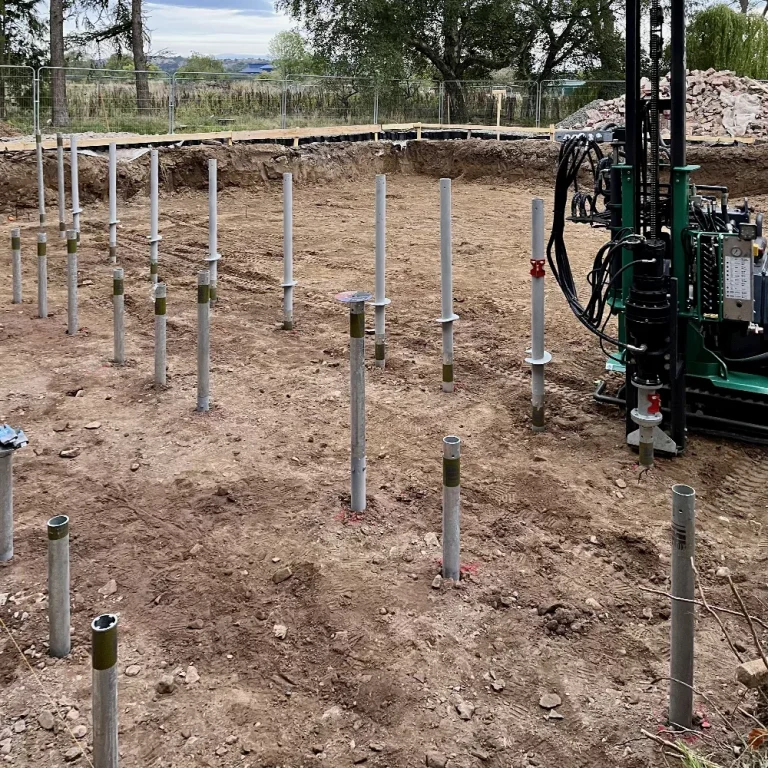In the world of construction, foundation solutions have seen remarkable advancements over the years. Among these, screw piles stand out as a game-changer, offering durability, cost-efficiency, and adaptability to diverse soil conditions. This innovative foundation technology is revolutionizing construction practices, making it an increasingly popular choice for residential, commercial, and industrial projects across Canada.

What Are Screw Piles and How Do They Work?
Screw piles, also known as helical piles, are steel shafts with helical plates welded to them. These piles are screwed into the ground using specialized equipment, creating a sturdy foundation for various structures. The installation process is quick and efficient, with minimal disruption to the surrounding area. By distributing load evenly across the soil, screw piles provide unparalleled stability, even in challenging conditions.
A Sustainable Approach to Foundations
Environmental considerations have become a key factor in construction projects, and screw pile installation supports this shift. The process involves less excavation compared to traditional concrete foundations, reducing soil disturbance and minimizing the carbon footprint. Additionally, many screw piles are made from recyclable steel, aligning with sustainable building practices.
According to experts, the reusability of screw piles further enhances their eco-friendliness, making them an ideal solution for temporary structures or relocatable projects.
Cost and Time Efficiency
One of the most significant advantages of screw piles is the reduction in project timelines and costs. Traditional foundations often require extensive excavation, formwork, and curing time for concrete. In contrast, screw piles can be installed within hours, significantly cutting down labour costs and project delays. This efficiency is particularly beneficial for projects in remote or weather-sensitive areas, where time is of the essence.
Adapting to Challenging Soil Conditions
Canada’s diverse geography poses unique challenges for construction foundations. From the frozen tundra of the north to coastal regions prone to erosion, soil conditions can vary dramatically. Screw pile installation shines in these scenarios, as the helical plates are designed to anchor securely into various soil types. Whether it’s clay, sand, or permafrost, screw piles provide a reliable solution that adapts to the environment.
Minimal Impact on Surroundings
Traditional foundation methods often result in significant ground disturbance, which can be problematic in environmentally sensitive areas or developed neighbourhoods. Screw piles, on the other hand, require no extensive digging or heavy machinery, making them ideal for projects in tight spaces or areas with strict environmental regulations.
Their low-vibration installation process ensures that nearby structures remain unaffected, making screw piles a popular choice for urban construction.
Applications Across Various Sectors
The versatility of screw piles extends to a wide range of applications. In residential projects, they’re often used for decks, patios, and home extensions. Commercially, they support everything from signage and light poles to large-scale buildings. They’re also a preferred choice for renewable energy projects, such as solar farms and wind turbines, due to their adaptability and minimal environmental impact.
Durability and Long-Term Performance
When investing in a foundation solution, longevity is crucial. Screw piles are engineered to withstand extreme weather conditions, ensuring the stability of the structures they support. Their corrosion-resistant coatings enhance durability, making them a dependable choice for long-term projects. Unlike traditional foundations, which may crack or shift over time, screw piles maintain their integrity, reducing the need for costly repairs.
Comparing Screw Piles to Traditional Foundations
While concrete foundations have been a staple in construction, they’re not always the most practical choice. They require substantial materials, time, and labour, and their rigidity can make them susceptible to cracking in unstable soil conditions. In comparison, screw piles offer a more flexible, durable, and environmentally friendly alternative, tailored to meet the demands of modern construction.
How to Choose the Right Screw Pile Provider
Selecting the right partner for screw pile installation is vital to ensure the success of your project. Reputable providers like Gamcon Helical Piles bring expertise and high-quality materials to the table, ensuring precise installation and reliable results. Their services are tailored to meet the unique needs of Canadian projects, making them a trusted choice for contractors and property owners alike.
Building a Foundation for the Future
As construction demands evolve, innovative solutions like screw piles are paving the way for more efficient and sustainable practices. Their adaptability, cost-effectiveness, and minimal environmental impact make them an indispensable tool in modern foundation systems. By choosing screw piles, builders can ensure a strong foundation that supports not just their structures, but also a commitment to a greener and more efficient future.
For Canadian construction projects, screw piles are not just a trend—they’re a transformative innovation changing how we think about foundations.


